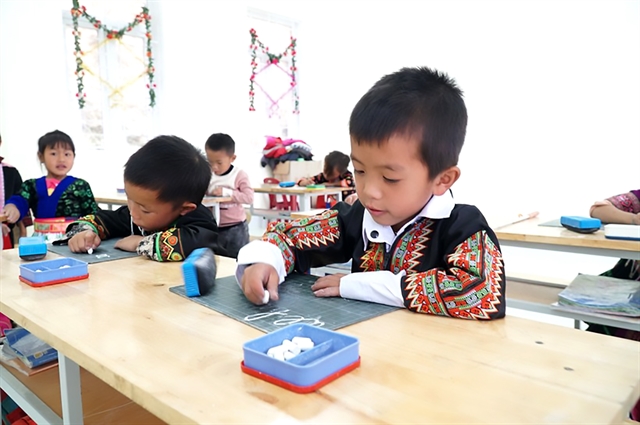 Society
Society

 |
| A Mông ethnic student in Nghệ An Province learns how to write in his mother tongue. — Photo giaoducthoidai.vn |
NGHỆ AN — While the new general education programme has ethnic languages as elective courses, the limited options on offer mean that schools are struggling to decide on alternatives for students whose mother tongue is not included.
Nhôn Mai Semi-boarding School for Ethnic Minorities is located in one of the most remote communes in Tương Dương District, Nghệ An Province.
Most of the school students are of Mông ethnicity, followed by Khơ Mú and Thái.
In accordance with the optional subjects in the new general education programme, Mông and Thái students can sign up to learn their ethnic languages.
However, the case is not the same for Khơ Mú students, even though they outnumbered the group of Thái students at the school.
As the optional subject of Ethnic Language only offers Bahnar, Chăm, Êđê, Khmer, Jrai, Mnông, Mông and Thái languages, Khơ Mú students have no textbook or teacher to learn theirs.
Trần Đức Quỳ, the school’s deputy dean said: “They are still very young, so they are not fully aware of the importance of language and writing in their ethnic cultural identity.
“Therefore, the enrolment for ethnic language courses depends on the attentiveness and encouragement from the teachers.
“However, from the viewpoint of parents and people, if we only have Thái and Mông language classes and none for Khơ Mú, there will be comparisons and concerns.”
Võ Tuyết Chinh, deputy head of Tương Dương District’s education and training division said that the locality is the largest mountainous area in Nghệ An Province, and is home to multiple ethnicities.
“Teaching ethnic languages is a way to preserve and promote the ethnic identity for students. This is also a mission of education in the mountainous areas," said Chinh as quoted by the Giáo dục & Thời đại (Education & Times) e-newspaper.
“However, the implementation process faces multiple challenges, including teaching materials and personnel.
“We hope a detailed guideline will soon be issued before we get to work.”
Meanwhile, Thông Thụ 1 Primary School in Quế Phong District is still weighing the optimal solution regarding language teaching.
Tăng Xuân Sơn, the school’s dean said that the majority of the students here are of Thái ethnicity, and they all use their mother tongue in their community.
However, the primary school does not yet teach them how to read and write Thái, as the local dialect has certain differences compared to the teaching materials available.
Therefore, the school is considering using the two weekly elective periods for English or supplemental Vietnamese classes.
This would help them with communication and a better understanding of the textbooks in the new education programme.
In Kỳ Sơn District, Đọoc Mạy Primary School has been holding Mông language classes for several years.
All of its pupils are of Mông ethnicity, and therefore are excited to learn to read and write in their mother tongue, said the school’s dean Trần Hữu Trường.
With his years of experience in the local education sector, Trường agreed that teaching ethnic languages is very difficult in schools whose students are of various ethnicities, instead of just one like Đọoc Mạy Commune.
He also shares the perspective that in these schools, students can utilise the two elective periods for English, if there are enough teachers, or for additional Vietnamese lessons.
Trường explained that ethnic primary schoolchildren tend to have difficulty in understanding the national language, and therefore take more time to learn compared to those who have the official language as their mother tongue.
These could also be beneficial for younger students when they go to the third grade and foreign language is a compulsory subject.
Thái Bình Dương, who is in charge of ethnic minority affairs at Nghệ An Provincial Department of Education and Training, said that based on the registrations submitted by local schools, the department will help organise ethnic language classes when there is sufficient teaching materials and teachers in charge.
They are also working on an alternative option for students whose ethnic language is not among those included in elective courses in the new general education programme to ensure the children’s benefits. — VNS




